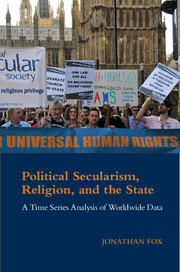Book contents
- Frontmatter
- Contents
- Acknowledgments
- 1 Introduction
- 2 Secularism or Secularization? The Secular-Religious Competition Perspective and Beyond
- 3 Establishment, Support, Neutrality, or Hostility: The Varieties of Official Religion Policy
- 4 State Support for Religion
- 5 Regulation, Restriction, and Control of the Majority Religion or All Religions
- 6 Religious Discrimination
- 7 Education, Abortion, and Proselytizing
- 8 Religion in Constitutions
- 9 Conclusions
- Appendix Data Collection and Reliability
- Bibliography
- Index
7 - Education, Abortion, and Proselytizing
Published online by Cambridge University Press: 05 May 2015
- Frontmatter
- Contents
- Acknowledgments
- 1 Introduction
- 2 Secularism or Secularization? The Secular-Religious Competition Perspective and Beyond
- 3 Establishment, Support, Neutrality, or Hostility: The Varieties of Official Religion Policy
- 4 State Support for Religion
- 5 Regulation, Restriction, and Control of the Majority Religion or All Religions
- 6 Religious Discrimination
- 7 Education, Abortion, and Proselytizing
- 8 Religion in Constitutions
- 9 Conclusions
- Appendix Data Collection and Reliability
- Bibliography
- Index
Summary
While all aspects of state religion policy are important, a small number of government religion policies are particularly pervasive and contentious across the globe. Religious education in public schools, restrictions on abortion, and limits on proselytizing are among them. These three issues are among the most important and active in the competition between political secularism and religious political actors described in the secular-religious competition perspective. When there are political clashes over state religion policies, these issues are frequently involved. The first two are especially prominent in the United States, involving multiple political and judicial battles at both the federal and local levels. The latter is a prominent issue in many other Western democracies, especially with regard to banning or deporting “radical” Muslim preachers.
In this chapter, I subject these three issues to a more intense examination than I apply to other aspects of state religion policy in previous chapters. I select these issues for heightened scrutiny for at least five reasons. First, each of these policy types is present in a significant majority states, which is true only of these and two other types of policy among the 110 specific policies examined here. This alone is sufficient to demonstrate that they are central issues to religion and politics. Second, there is considerable diversity across states in the specifics of these policies, so simply measuring their presence and absence is not enough to fully understand them. Third, each of these policies involves significant religious principles and substantially influences the lives of large numbers of people. Fourth, as noted earlier, all of these policies are the subject of considerable political contention. This makes them excellent case studies of the competition between secular and religious forces in society and politics. Finally, examining these three types of policy can provide additional insight into the nature of state religion policy and how it has been evolving during the 19-year period covered by this study.
Religious Education in Public Schools
Imagine a country where public schools include religious education – not as an academic subject but religion taught as existential truth.
- Type
- Chapter
- Information
- Political Secularism, Religion, and the StateA Time Series Analysis of Worldwide Data, pp. 168 - 200Publisher: Cambridge University PressPrint publication year: 2015

